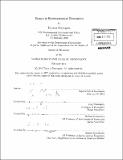Essays in environmental economics
Author(s)
Deryugina, Tatyana
DownloadFull printable version (9.439Mb)
Other Contributors
Massachusetts Institute of Technology. Dept. of Economics.
Advisor
Amy Finkelstein and Michael Greenstone.
Terms of use
Metadata
Show full item recordAbstract
This thesis examines various aspects of environmental economics. The first chapter estimates how individuals' beliefs about climate change are affected by local weather fluctuations. Climate change is a one-time uncertain event with no opportunities for learning; the belief updating process may not be fully Bayesian. Using unique survey data on beliefs about the occurrence of the effects of global warming, I estimate how individuals use local temperature fluctuations in forming these beliefs. I test for the presence of several well-known psychological heuristics and find strong evidence for representativeness, some evidence for availability and no evidence for associativeness. I find that very short-run temperature fluctuations (1 day - 2 weeks) have no effect on beliefs about the occurrence of global warming, but that longer-run fluctuations (1 month - 1 year) are significant predictors of beliefs. Only respondents with a conservative political ideology are affected by temperature abnormalities. In the second chapter, I examine the economic impacts of natural disasters by estimating the effect of hurricanes on US counties' economies 0-10 years after landfall. Overall, I find no substantial changes in a county's population, earnings, or the employment rate. The largest empirical effect of a hurricane is observed in large increases in government transfer payments to individuals, such as unemployment insurance. The estimated magnitude of the extra transfer payments is large. While per capita disaster aid averages $356 per hurricane in current dollars, I estimate that in the eleven years following a hurricane an affected county receives additional non-disaster government transfers of $67 per capita per year. Private insurance-related transfers over the same time period average only $2.4 per capita per year. The fiscal costs of natural disasters are thus much larger than the cost of disaster aid alone. Because of the deadweight loss of taxation and moral hazard concerns, the benefits of policies that reduce disaster vulnerability, such as climate change mitigation and removal of insurance subsidies, are larger than previously thought. Finally, the substantial increase in non-disaster transfers suggests that the lack of changes in other economic indicators may be in part due to various social safety nets. In the third chapter, I estimate the extent of adverse selection in area yield insurance. Despite a long-run decrease in developed countries' vulnerability to weather shocks, agriculture worldwide remains susceptible to weather fluctuations. If climate change increases the frequency and intensity of extreme weather events, as it is predicted to do, food prices will likely become more volatile. A well-functioning insurance market is key to keeping the agricultural sector stable. I discuss the institutional and empirical features of the US crop insurance market. I outline the ways in which market designers have attempted to minimize adverse selection and moral hazard, as well as the remaining ways in which the market remains vulnerable to these. I then test for a particular form of adverse selection: whether public information (last year's average yield in the county) that is not explicitly priced by crop insurance companies predicts takeup of area yield insurance plans. I find no evidence that the recent yield influences takeup. I then perform another reduced-form test, using end-of-growing season yields as predictors of insurance takeup at the beginning of the growing season, and find that area yield insurance takeup is higher when average yields are higher. This suggests that the net selection into area yield plans favors providers, not buyers of insurance. In some specifications, the total demand for crop insurance is affected by current and past yields as well, potentially due to changes in the desirability of other plans.
Description
Thesis (Ph. D.)--Massachusetts Institute of Technology, Dept. of Economics, 2012. Cataloged from PDF version of thesis. Includes bibliographical references.
Date issued
2012Department
Massachusetts Institute of Technology. Department of EconomicsPublisher
Massachusetts Institute of Technology
Keywords
Economics.